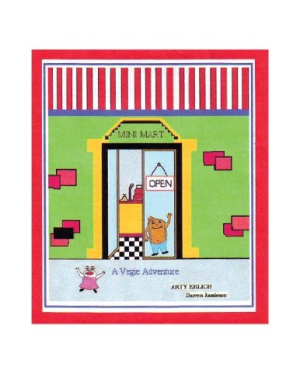A Vegie Adventure
Not many kids like to eat their vegetables—it’s the subject of one of the eternal battles between parent and child. Any effort to help turn the tide against nutritionally deficient foods is a noble endeavor. In A Vegie Adventure, Arty Erlich offers his contribution to the cause, with a tale of food anthropomorphism.
The drama unfolds at a supermarket after closing time, when Tim Tomato and his vegetable friends are awakened by strange noises. The vegetables soon meet up with the lollies, who are troublemakers from aisle thirteen, in the equivalent of a food fight. The lollies include Mandy Marshmallow, Larry Licorice, and Jelly Baby. One would think a supermarket candy aisle would offer a multitude of inspirations for characters, but, strangely, the remaining lollies reference unfamiliar treats, such as Jill Jaffa, and names that don’t seem to reference candy at all, like Sam Snake. There’s also Ben Banana. Sure, the banana is a fruit, not a vegetable, but since when is it as nutritionally deficient as candy?
The author notes that his story may provide an opportunity for “conflict resolution discussion” in addition to its message about eating healthy foods. With the vegetables overpowering the lollies and forcing them to clean up the mess the partying “candy” has made, it might make for a short discussion.
The book’s artwork is rudimentary. It looks as though it were drawn by the book’s target audience, which is children under age ten. In some situations, this might be a charming touch, but here that’s not the case. The colors are muddy: Peter Potato changes from brown to orange without explanation; and, on some pages, Tim Tomato and Carl Carrot appear equally red, while Brian Broccoli suddenly takes on the color of Sally Spinach. The drawings appear to have been colored by a kid with a marker set, and, when one marker dried up, it was replaced with whatever color was available. Another problem is that characters’ facial expressions don’t match the dialogue. Tim Tomato, for example, looks positively cheerful as he whispers about having heard strange noises on aisle thirteen. And the pages themselves look as if they’ve been reproduced from photocopies.
Despite its low production values, A Vegie Adventure‘s primary message is important. It just doesn’t go far enough. While Erlich’s vegetable characters do show themselves to be fitter than the defeated lollies, the author makes no mention of how any of the foods in the book affect the human body. His final message is a simple cry of “Vegies are the best!” For some readers, that may be enough.
Reviewed by
Peter Dabbene
Disclosure: This article is not an endorsement, but a review. The publisher of this book provided free copies of the book and paid a small fee to have their book reviewed by a professional reviewer. Foreword Reviews and Clarion Reviews make no guarantee that the publisher will receive a positive review. Foreword Magazine, Inc. is disclosing this in accordance with the Federal Trade Commission’s 16 CFR, Part 255.

